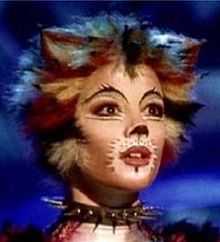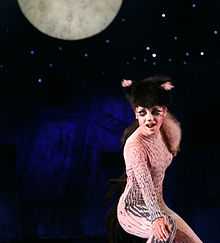Jemima (cat)


Jemima is a principal character in the musical play Cats, written by Andrew Lloyd Webber using the poetry of T. S. Eliot. She is the youngest member of the tribe of Cats, being the first one in her whole tribe to accept Grizabella by singing with her a small part in the song 'Memory'.
Character
In the musical play Cats, Jemima is a kitten and, while usually a chorus cat, plays a role in accepting Grizabella; she is among several kittens (the others being Victoria, Electra, and Etcetera) who trust Grizabella and are pulled away in efforts to reject the aging cat. A wide-eyed, beautiful innocent cat with an ethereal voice, she truly hears Grizabella's plea for re-acceptance and encourages the older cat for a chorus in "Memory". Her coat is a rich satin red with black, brown and white tinges and a white chest. Her gloves/leg warmers are black and white, and the actress portraying her often has large eyes to make the character seem more innocent. When the show was reworked in 2014, her wig colors were changed from red and black to a less blocky, scruffy brown.
She is the youngest kitten, and is attracted to the charismatic Rum Tum Tugger; in particular, Tugger seems to have a soft spot for her as well. She also seems attracted to Alonzo, Tumblebrutus, Pouncival, and Plato and arguably some others depending on the production and may have a relationship with one of them. She separately dances with the first, and snuggles with Plato during Old Deuteronomy's entrance and also with Tumblebrutus after the Mating Dance, even though she is very close to Pouncival and they are seen often with each other. It is also seen that Mistoffelees and Jemima have a relationship as she interacts with him in his song and during the Invitation to the Jellicle Ball. In some productions, Mistoffelees and Jemima are shown to be close, as he goes and guides her to the other cats after she welcomes Gizabella back to the tribe.
Jemima is very close to Victoria, and the two seem to be best friends. She may also have a rare relationship with the moon, the symbol of life for the Jellicles, because she sings to the moon several times and sings of the happiness and new lives that it gives. She might have seen into the past of Grizabella, which could be why she is one of the only cats to accept her. She also tries to help her when she shows up at various moments, when all of the other cats (except Victoria) turn away from her, and do not accept her. She and Victoria seem to be the only cats who always fully accepted Grizabella.
She also has a connection with the leader, Old Deuteronomy. When he sings of 'The Moments of Happiness', naturally, the deep, reflective philosophical verse goes over everyone's heads. So he sends the message again through two cats (they vary; in the film it is Coricopat and Tantomile) and finally to Jemima, who sings the true meaning again for everyone to hear. She distills the essence of Deuteronomy's learning, and all the cats sing with her.
It is unclear who her family is in the musical, although she demonstrates closeness with various cats throughout the tribe.
Casting
- Sarah Brightman originated the role in London
- Veerle Casteleyn played Jemima in the 1998 video version
- Helen Massey sang dubbed over Jemima in the 1998 video version
- Ruthie Henshall played Jemima in London in 1988.[1]
- Samantha Shafer played the part in the Worldwide tour from 2007–2008
- Alexandra Jay played Jemima in 2001 London cast
- Alyse Jai Davies played Sillabub (aka Jemima) in the Australian Tour 2010
- Aubrey Elson played the part known as Sillabub in the Worldwide tour from 2008–2010
- Heidi Giberson played the part known as Sillabub in the Worldwide Tour from 2010-2011.
- Natasha Mould played Jemima in the UK Tour 2013-14, and currently portrays Jemima on the West End run.
Syllabub
When the show transferred from London to Broadway, the name "Jemima" was believed to carry negative racial connotations, such as mentioned in relation to Aunt Jemima. The character was renamed using another of T. S. Eliot's Jellicle names, "Syllabub". This, he explained, is a mixture of "Silly" and "Beelzebub" - devil-ish. Sillabub's costume is generally slightly paler than Jemima's. In the Japanese production, Sillabub has a gold and white coat. In the Asian Tour, Sillabub is depicted as similar to Demeter, but with a paler coat.
The name "Syllabub" has different connotations in the UK, being the name of a traditional dessert. The name Jemima carries no racial connotations in the UK, however the name is generally recognised as a Victorian girl's name (such as the daughter in Chitty Chitty Bang Bang).
References
- ↑ "Official Ruthie Henshall Website". stage work. Retrieved 2008-02-28.
| ||||||||||||||||||||||||||